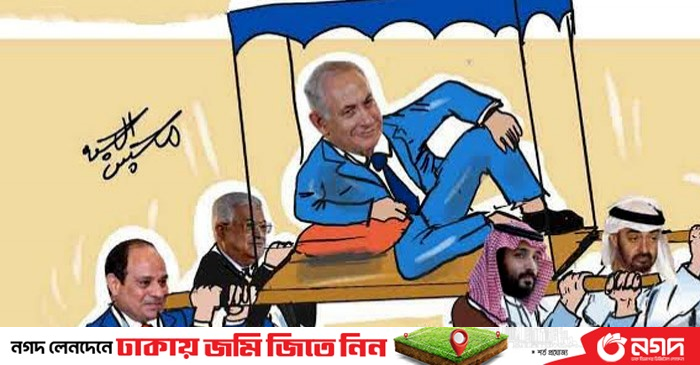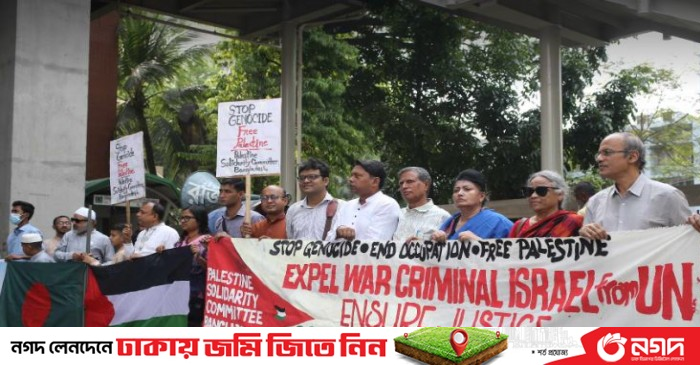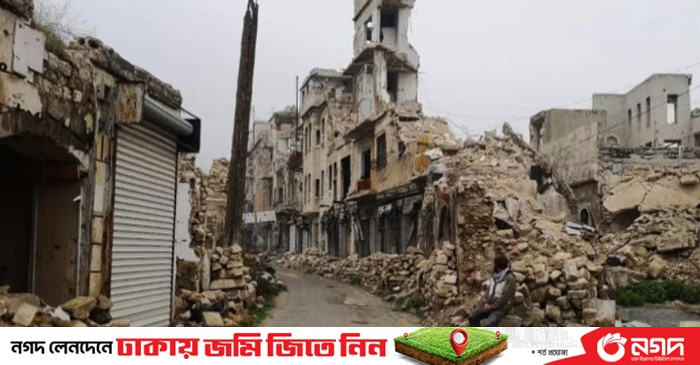Saif
Senior Member
- Messages
- 17,408
- Likes
- 8,373
- Nation

- Residence

- Axis Group


From victimhood to apartheid statehood
THE tapestry of Jewish myths and history spans over two millennia. The Jewish saga of ‘diaspora’ to ‘aliyah’, of migrations and...
 www.newagebd.net
www.newagebd.net
From victimhood to apartheid statehood
Aminul Sarwar | Published: 00:00, Apr 08,2024

— Euronews
THE tapestry of Jewish myths and history spans over two millennia. The Jewish saga of 'diaspora' to 'aliyah', of migrations and pogroms, of persecution and the Holocaust is woven with elements of both myths and history. The tale is intertwined with the humanitarian cries of millions of Jews in the past, but the present is rather marred by an ironic role reversal of the same people through their own doings against the Arabs of Palestine. The story always begins with the myths of the 'chosen ones' — an utterly regressive and supremacist conjecture in the purview of the modern value system — finding the promised land, an enduring diaspora, and sufferings that embody a textbook case of resilience. Yet, the end to date horrifically looks to have gone wrong as we contemplate the modern history of Israel and Palestine. From the Babylonian exile to the destruction of the Second Temple, the Jewish people endured displacement and persecution and forged a collective identity rooted in survival. On one hand, we have the biblical accounts, from Abraham's journey to Moses leading the Israelites, setting a spiritual backdrop to a historical drama of triumphs and tribulations; on the other hand, we see a repressive statehood with brutal military power, persecution, and a genocidal regime hell-bent on uprooting and annihilating the legitimate resistance of the people whose homes were taken away.
Centuries of diaspora tested Jewish adaptability, leading to intellectual and cultural contributions during the Islamic Golden Age and challenges in mediaeval Europe's ghettos. The 19th-century rise of Zionism, seeking a Jewish homeland, embodied the longing for a promised land rooted in religious conviction and historical yearning. Facing perpetual prejudice due to socio-cultural and economic practices like usury or the flawed onus of blood libel, along with cultural mistrust in the general population because of their closely bonded, introverted community lifestyle, Jewish people sought political agency. This culminated in the vision of a Jewish state during the nationalistic waves of late 19th-century Europe.
The Dreyfus Affair in late 19th-century France marked the immediate nucleus of Zionism, as Theodor Herzl's vision for a national homeland emerged in response to anti-Semitism. The establishment of Israel in 1948 was a transformative moment, shifting from victimhood to statehood. However, this journey unveiled a paradox: the persecuted becoming powerful. Herzl's vision responded to centuries of anti-Semitism, but the implementation of Zionism faced challenges reconciling diverse cultural backgrounds. The historical rise of Zionism underpinned a supremacist ideology, resonating in the ongoing Israeli-Palestinian conflict.
The Holocaust cast a dark shadow, leading to global acknowledgment of the need for a Jewish homeland. The State of Israel's establishment in 1948 reflected the transition from victims of genocide to architects of statehood. As the Jewish people shifted from victims to state builders, the complexity of historical circumstances shaped the Israeli-Palestinian conflict. Post-World War II dynamics witnessed Western support for Zionism, contributing to the displacement of Palestinian communities. The power dynamics tilted towards Israel, challenging a just and lasting resolution.
The historical narrative unravels a crisis where the persecuted became state architects, facing the dilemma between managing power and security. The call for coexistence becomes intricate as power dynamics shift. While the well-equipped Jewish population with Western education and knowledge enjoyed Western sympathy due to their racial and cultural affinity with Western people, contemporary Arabs in Palestine lacked political agency within the existing state system, facing a shortage of knowledge and representation during the interbellum years. As a result, a Western-dominated world order, burdened by the collective guilt of the Holocaust, made decisions that shamefully disregarded the political, social rights, and dignity of Palestinian Arabs. Since the inception of the conflict during the mass immigration of Jewish people to Palestine, communal riots, tensions, the Naqba, and subsequent Arab-Israel wars, it has consistently manifested as a one-sided struggle between Palestinian Arabs and the Jewish State of Israel.
Jewish people formulated the basis of Zionism on the premise that they are a community that has been persecuted throughout history because of their identity and minority status. There is no denying the fact that Jewish people had been living in ghettos across many European kingdoms and were often subjected to harassment, antipathy, and social and economic boycotts by the mainstream population due to anti-Semitic outlooks. But, as we have seen, if not premeditated, Zionism's legacy has ultimately bred a supremacist ideology, transforming statehood pursuit into an apartheid regime. It needs no elaboration, as a look into the history of modern Israel makes it pretty evident. The once-persecuted Jewish community held political power, resulting in unforeseen role reversals with far-reaching consequences. The paradox of Jewish statehood calls for reckoning with the unintended consequences of Zionism. It urges us to navigate the complexities of identity, power, and historical burdens with nuance and understanding. The pursuit of justice and humanism must prevail over entrenched prejudices, fostering a world where the rights of all are recognized and respected.
In tracing the Jewish Israeli journey from victimhood to apartheid statehood, a fabric woven with historical resilience, political aspirations, and obvious consequences unfolds. The Jewish people's narrative, etched with tales of survival, diaspora, and the establishment of the State of Israel, reflects a transformative evolution. From the challenges of historical persecution to the complexities of managing power and security, the journey has been paradoxical.
Zionism, born out of the need for a Jewish homeland in response to anti-Semitism, apparently inadvertently sowed the seeds of ethno-religious supremacy, leading to the unintended legacy of an apartheid regime. The role reversals, where the once-persecuted gained political power, have profound consequences, shaping the ongoing Israeli-Palestinian conflict.
History calls for a reckoning with the unintended consequences of Zionism, urging bold reflections on identity, power, and historical burdens. The pursuit of justice and humanism must prevail over entrenched prejudices, fostering a world where the rights of all are recognised.
Moving forward, the world must ensure the engagement of the belligerent parties in open dialogue, acknowledging the multifaceted layers and dimensions of the conflict. A commitment to understanding historical transitions and fostering empathy is crucial. Collective efforts to bridge divides and dispel prejudices can pave the way for a just and lasting resolution. The only solution on the horizon is the 'two-state solution,' recognising the existence, security, and respect for the lives and dignity of the Palestinian Arabs and the Israeli Jews.
Aminul Sarwar, a retired army official, is a banker.
Aminul Sarwar | Published: 00:00, Apr 08,2024
— Euronews
THE tapestry of Jewish myths and history spans over two millennia. The Jewish saga of 'diaspora' to 'aliyah', of migrations and pogroms, of persecution and the Holocaust is woven with elements of both myths and history. The tale is intertwined with the humanitarian cries of millions of Jews in the past, but the present is rather marred by an ironic role reversal of the same people through their own doings against the Arabs of Palestine. The story always begins with the myths of the 'chosen ones' — an utterly regressive and supremacist conjecture in the purview of the modern value system — finding the promised land, an enduring diaspora, and sufferings that embody a textbook case of resilience. Yet, the end to date horrifically looks to have gone wrong as we contemplate the modern history of Israel and Palestine. From the Babylonian exile to the destruction of the Second Temple, the Jewish people endured displacement and persecution and forged a collective identity rooted in survival. On one hand, we have the biblical accounts, from Abraham's journey to Moses leading the Israelites, setting a spiritual backdrop to a historical drama of triumphs and tribulations; on the other hand, we see a repressive statehood with brutal military power, persecution, and a genocidal regime hell-bent on uprooting and annihilating the legitimate resistance of the people whose homes were taken away.
Centuries of diaspora tested Jewish adaptability, leading to intellectual and cultural contributions during the Islamic Golden Age and challenges in mediaeval Europe's ghettos. The 19th-century rise of Zionism, seeking a Jewish homeland, embodied the longing for a promised land rooted in religious conviction and historical yearning. Facing perpetual prejudice due to socio-cultural and economic practices like usury or the flawed onus of blood libel, along with cultural mistrust in the general population because of their closely bonded, introverted community lifestyle, Jewish people sought political agency. This culminated in the vision of a Jewish state during the nationalistic waves of late 19th-century Europe.
The Dreyfus Affair in late 19th-century France marked the immediate nucleus of Zionism, as Theodor Herzl's vision for a national homeland emerged in response to anti-Semitism. The establishment of Israel in 1948 was a transformative moment, shifting from victimhood to statehood. However, this journey unveiled a paradox: the persecuted becoming powerful. Herzl's vision responded to centuries of anti-Semitism, but the implementation of Zionism faced challenges reconciling diverse cultural backgrounds. The historical rise of Zionism underpinned a supremacist ideology, resonating in the ongoing Israeli-Palestinian conflict.
The Holocaust cast a dark shadow, leading to global acknowledgment of the need for a Jewish homeland. The State of Israel's establishment in 1948 reflected the transition from victims of genocide to architects of statehood. As the Jewish people shifted from victims to state builders, the complexity of historical circumstances shaped the Israeli-Palestinian conflict. Post-World War II dynamics witnessed Western support for Zionism, contributing to the displacement of Palestinian communities. The power dynamics tilted towards Israel, challenging a just and lasting resolution.
The historical narrative unravels a crisis where the persecuted became state architects, facing the dilemma between managing power and security. The call for coexistence becomes intricate as power dynamics shift. While the well-equipped Jewish population with Western education and knowledge enjoyed Western sympathy due to their racial and cultural affinity with Western people, contemporary Arabs in Palestine lacked political agency within the existing state system, facing a shortage of knowledge and representation during the interbellum years. As a result, a Western-dominated world order, burdened by the collective guilt of the Holocaust, made decisions that shamefully disregarded the political, social rights, and dignity of Palestinian Arabs. Since the inception of the conflict during the mass immigration of Jewish people to Palestine, communal riots, tensions, the Naqba, and subsequent Arab-Israel wars, it has consistently manifested as a one-sided struggle between Palestinian Arabs and the Jewish State of Israel.
Jewish people formulated the basis of Zionism on the premise that they are a community that has been persecuted throughout history because of their identity and minority status. There is no denying the fact that Jewish people had been living in ghettos across many European kingdoms and were often subjected to harassment, antipathy, and social and economic boycotts by the mainstream population due to anti-Semitic outlooks. But, as we have seen, if not premeditated, Zionism's legacy has ultimately bred a supremacist ideology, transforming statehood pursuit into an apartheid regime. It needs no elaboration, as a look into the history of modern Israel makes it pretty evident. The once-persecuted Jewish community held political power, resulting in unforeseen role reversals with far-reaching consequences. The paradox of Jewish statehood calls for reckoning with the unintended consequences of Zionism. It urges us to navigate the complexities of identity, power, and historical burdens with nuance and understanding. The pursuit of justice and humanism must prevail over entrenched prejudices, fostering a world where the rights of all are recognized and respected.
In tracing the Jewish Israeli journey from victimhood to apartheid statehood, a fabric woven with historical resilience, political aspirations, and obvious consequences unfolds. The Jewish people's narrative, etched with tales of survival, diaspora, and the establishment of the State of Israel, reflects a transformative evolution. From the challenges of historical persecution to the complexities of managing power and security, the journey has been paradoxical.
Zionism, born out of the need for a Jewish homeland in response to anti-Semitism, apparently inadvertently sowed the seeds of ethno-religious supremacy, leading to the unintended legacy of an apartheid regime. The role reversals, where the once-persecuted gained political power, have profound consequences, shaping the ongoing Israeli-Palestinian conflict.
History calls for a reckoning with the unintended consequences of Zionism, urging bold reflections on identity, power, and historical burdens. The pursuit of justice and humanism must prevail over entrenched prejudices, fostering a world where the rights of all are recognised.
Moving forward, the world must ensure the engagement of the belligerent parties in open dialogue, acknowledging the multifaceted layers and dimensions of the conflict. A commitment to understanding historical transitions and fostering empathy is crucial. Collective efforts to bridge divides and dispel prejudices can pave the way for a just and lasting resolution. The only solution on the horizon is the 'two-state solution,' recognising the existence, security, and respect for the lives and dignity of the Palestinian Arabs and the Israeli Jews.
Aminul Sarwar, a retired army official, is a banker.





